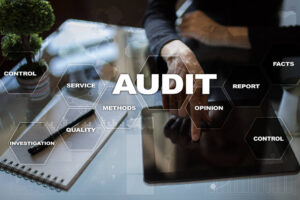In today’s complex business landscape, regulatory compliance is a critical aspect of operations for organizations across various industries. Compliance with laws, regulations, and industry standards not only helps maintain legal and ethical integrity but also mitigates risks and safeguards the company’s reputation. One effective tool in achieving and maintaining compliance is through regular compliance audits.

In this article, we will explore the significance of compliance audits, their objectives, the audit process, and how they contribute to overall business success.
What is Compliance Audits?
Compliance audits are systematic and independent assessments conducted to evaluate an organization’s adherence to laws, regulations, internal policies, and industry standards. They aim to ensure that the organization’s operations align with the prescribed guidelines and identify any areas of non-compliance or potential risks. Compliance audits are typically performed by internal or external auditors who possess expertise in regulatory compliance and auditing practices.
Objectives of Compliance Audits:
- Identifying Compliance Gaps: The primary objective of a compliance audit is to identify areas of non-compliance within an organization. Auditors assess the organization’s policies, procedures, and practices to determine whether they meet the required legal and regulatory standards.
- Mitigating Risks: Compliance audits help identify potential risks and vulnerabilities that may expose the organization to legal, financial, or reputational harm. By pinpointing these risks, organizations can implement corrective measures to mitigate them effectively.
- Ensuring Accuracy and Integrity: Audits assess the accuracy and integrity of an organization’s financial statements, internal controls, and documentation. This ensures that the organization maintains transparent and reliable records, reducing the likelihood of fraudulent activities.
- Promoting Ethical Practices: Compliance audits promote ethical conduct by evaluating an organization’s adherence to ethical guidelines and standards. They help foster a culture of integrity, accountability, and responsibility within the organization.
The Compliance Audit Process:
- Planning: The audit process begins with careful planning. Auditors define the scope, objectives, and timelines of the audit. They review relevant laws, regulations, policies, and industry standards to establish the framework for the audit.
- Data Collection and Analysis: Auditors gather information and data related to the organization’s operations, policies, and procedures. This includes reviewing documentation, conducting interviews, and analyzing records to assess compliance levels.
- Evaluation and Testing: Auditors evaluate the organization’s internal controls, processes, and practices against the established criteria. They may perform sample testing and verification procedures to ensure compliance with applicable laws and regulations.
- Findings and Reporting: After completing the evaluation, auditors compile their findings and prepare a comprehensive audit report. The report highlights areas of non-compliance, identifies potential risks, and provides recommendations for improvement.
- Corrective Actions: Based on the audit findings, the organization develops and implements corrective actions to address non-compliance issues. These actions may involve revising policies and procedures, enhancing internal controls, providing employee training, or taking disciplinary measures if necessary.

Benefits of Compliance Audits:
- Legal and Regulatory Compliance: Compliance audits help organizations ensure that they meet legal and regulatory requirements. By identifying areas of non-compliance, organizations can take proactive measures to rectify any deficiencies, reducing the risk of legal sanctions or penalties.
- Risk Mitigation: Compliance audits enable organizations to identify and mitigate potential risks. By addressing compliance gaps and vulnerabilities, organizations can safeguard their assets, protect against fraud, and minimize the chances of reputational damage.
- Improved Efficiency and Effectiveness: Compliance audits evaluate the effectiveness of an organization’s policies, procedures, and controls. By identifying inefficiencies or areas for improvement, organizations can streamline processes, enhance operational efficiency, and reduce costs.
Learn more at Wiki as well.